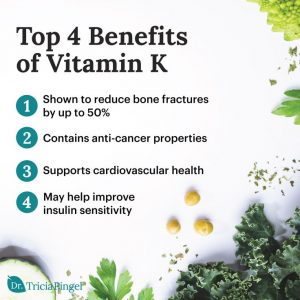Vitamin K plays a key role in helping the blood clot, preventing excessive bleeding. Unlike many other vitamins, vitamin K is not typically used as a dietary supplement.
Vitamin K is actually a group of compounds. The most important of these compounds appears to be vitamin K1 and vitamin K2. Vitamin K1 is obtained from leafy greens and some other vegetables. Vitamin K2 is a group of compounds largely obtained from meats, cheeses, and eggs, and synthesized by bacteria.

Vitamin-K
Recently, some people have looked to vitamin K2 to treat osteoporosis and steroid-induced bone loss, but the research is conflicting. At this point there is not enough data to recommend using vitamin K2 for osteoporosis.
Keep reading this article with PK Halder to understand the types of vitamins and their benefits.
Why do people take vitamin K?
Low levels of vitamin K can raise the risk of uncontrolled bleeding. While vitamin K deficiencies are rare in adults, they are very common in newborn infants.

vitamin K health benefits
A single injection of vitamin K for newborns is standard. Vitamin K is also used to counteract an overdose of the blood thinner Coumadin.
While vitamin K deficiencies are uncommon, you may be at higher risk if you:
- Have a disease that affects absorption in the digestive tract, such as Crohn’s disease or active celiac disease
- Take drugs that interfere with vitamin K absorption
- Are severely malnourished
- Drink alcohol heavily
In these cases, a health care provider might suggest vitamin K supplements.
Uses of vitamin K for cancer, for the symptoms of morning sickness, for the removal of spider veins, and for other conditions are unproven. Learn more about vitamins k2 and d3 as well as which foods pack the highest amount.
How much vitamin K should you take?
The recommended adequate intake of vitamin K you take in, both from food and other sources is below. Most people get enough vitamin K from their diets.
| Group | Adequate Intake |
| Children 0-6 months | 2 micrograms/day |
| Children 7-12 months | 2.5 micrograms/day |
| Children 1-3 | 30 micrograms/day |
| Children 4-8 | 55 micrograms/day |
| Children 9-13 | 60 micrograms/day |
| Girls 14-18 | 75 micrograms/day |
| Women 19 and up | 90 micrograms/day |
| Women, pregnant or (19-50) | 90 micrograms/day |
| Women, pregnant or breastfeeding (under 19) | 75 micrograms/day |
| Boys 14-18 | 75 micrograms/day |
| Men 19 and up | 120 micrograms/day |
There have been no adverse effects of vitamin K seen with the levels found in food or supplements. However, this does not rule out danger with high dose. Researchers have not set a maximum safe dose.
Can you get vitamin K naturally from foods?
Good natural food sources of vitamin K include:
- Vegetables like spinach, asparagus, and broccoli
- Legumes like soybeans
You can also meet your
daily requirement with foods that have lesser amounts of vitamin K:
- Eggs
- Strawberries
- Meat like liver
| Food | Micrograms (mcg) per serving |
Percent DV* |
|---|---|---|
| Natto, 3 ounces (as MK-7) | 850 | 708 |
| Collards, frozen, boiled, ½ cup | 530 | 442 |
| Turnip greens, frozen, boiled ½ cup | 426 | 355 |
| Spinach, raw, 1 cup | 145 | 121 |
| Kale, raw, 1 cup | 113 | 94 |
| Broccoli, chopped, boiled, ½ cup | 110 | 92 |
| Soybeans, roasted, ½ cup | 43 | 36 |
| Carrot juice, ¾ cup | 28 | 23 |
| Soybean oil, 1 tablespoon | 25 | 21 |
| Edamame, frozen, prepared, ½ cup | 21 | 18 |
| Pumpkin, canned, ½ cup | 20 | 17 |
| Pomegranate juice, ¾ cup | 19 | 16 |
| Okra, raw, ½ cup | 16 | 13 |
| Salad dressing, Caesar, 1 tablespoon | 15 | 13 |
| Pine nuts, dried, 1 ounce | 15 | 13 |
| Blueberries, raw, ½ cup | 14 | 12 |
| Iceberg lettuce, raw, 1 cup | 14 | 12 |
| Chicken, breast, rotisserie, 3 ounces (as MK-4) | 13 | 11 |
| Grapes, ½ cup | 11 | 9 |
| Vegetable juice cocktail, ¾ cup | 10 | 8 |
| Canola oil, 1 tablespoon | 10 | 8 |
| Cashews, dry roasted, 1 ounce | 10 | 8 |
| Carrots, raw, 1 medium | 8 | 7 |
| Olive oil, 1 tablespoon | 8 | 7 |
| Ground beef, broiled, 3 ounces (as MK-4) | 6 | 5 |
| Figs, dried, ¼ cup | 6 | 5 |
| Chicken liver, braised, 3 ounces (as MK-4) | 6 | 5 |
| Ham, roasted or pan-broiled, 3 ounces (as MK-4) | 4 | 3 |
| Cheddar cheese, 1½ ounces (as MK-4) | 4 | 3 |
| Mixed nuts, dry roasted, 1 ounce | 4 | 3 |
| Egg, hard boiled, 1 large (as MK-4) | 4 | 3 |
| Mozzarella cheese, 1½ ounces (as MK-4) | 2 | 2 |
| Milk, 2%, 1 cup (as MK-4) | 1 | 1 |
| Salmon, sockeye, cooked, 3 ounces (as MK-4) | 0.3 | 0 |
| Shrimp, cooked, 3 ounces (as MK-4) | 0.3 | 0 |
What are the risks of taking vitamin K?

risks of taking vitamin K
Side effects of oral vitamin K at recommended doses are rare.
Interactions. Many drugs can interfere with the effects of vitamin K. They include antacids, blood thinners, antibiotics, aspirin, and drugs for cancer, seizures, high cholesterol, and other conditions.
Risks. You should not use vitamin K supplements unless your health care provider tells you to. People using Coumadin for heart problems, clotting disorders, or other conditions may need to watch their diets closely to control the amount of vitamin K they take in. They should not use vitamin K supplements unless advised to do so by their health care provider.
Vitamin K and Healthful Diets
The federal government’s 2020–2025 Dietary Guidelines for Americans notes that “Because foods provide an array of nutrients and other components that have benefits for health, nutritional needs should be met primarily through foods. … In some cases, fortified foods and dietary supplements are useful when it is not possible otherwise to meet needs for one or more nutrients (e.g., during specific life stages such as pregnancy).”
For more information about building a healthy dietary pattern, refer to the Dietary Guidelines for Americans![]() and the U.S. Department of Agriculture’s MyPlate.
and the U.S. Department of Agriculture’s MyPlate.![]()
The Dietary Guidelines for Americans describes a healthy dietary pattern as one that:
-
- Includes a variety of vegetables; fruits; grains (at least half whole grains); fat-free and low-fat milk, yogurt, and cheese; and oils.
- Many vegetables are excellent sources of vitamin K, and some fruits and fruit juices contain vitamin K. Cheese contains vitamin K.
- Includes a variety of protein foods such as lean meats; poultry; eggs; seafood; beans, peas, and lentils; nuts and seeds; and soy products.
- Soybeans and nuts contain vitamin K.
- Limits foods and beverages higher in added sugars, saturated fat, and sodium.
- Includes a variety of vegetables; fruits; grains (at least half whole grains); fat-free and low-fat milk, yogurt, and cheese; and oils.
-
- Limits alcoholic beverages.
- Stays within your daily calorie needs.
Reference
https://www.webmd.com/vitamins-and-supplements/supplement-guide-vitamin-k
https://ods.od.nih.gov/factsheets/VitaminK-HealthProfessional/











